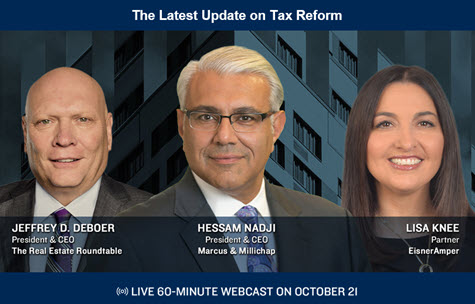
Senate Democrats voted August 11 to advance a $3.5 trillion “human infrastructure” budget resolution, which allows development of legislation that could pass later this year without any Republican support. The budget blueprint passed on a party-line vote of 50-49 the day after the Senate passed a $1.2 trillion “physical infrastructure” bill on a bipartisan basis. (BGov, Aug 11 and Roundtable Weekly, story above)
Why It Matters
- The Senate budget resolution supports President Biden’s wide-ranging domestic priorities that aim to expand the federal social safety net and combat climate change. (New York Times and The Hill, Aug. 11)
- The sprawling human infrastructure proposal would be partially financed by raising taxes on corporations and wealthy individuals – and potentially include a variety of tax increases affecting commercial real estate.
- The Senate measure also provided instructions for various committees to craft bills under “reconciliation” budget rules. If approved by the Senate Parliamentarian, the committees’ work would be combined into final legislation that could pass on a majority vote, thereby bypassing a Republican filibuster. (Senate Democratic Memorandum, Aug. 9)
- The House announced this week that it will return early from summer recess on Aug. 23 to consider the budget resolution. (Associated Press and CQ, Aug. 11)
- House Speaker Nancy Pelosi (D-CA) reiterated on Aug. 11 that until the Senate finishes and passes the massive reconciliation bill, the House will not vote on the physical infrastructure legislation. Other Members of the Democratic Caucus, including Rep. Josh Gottheimer (D-NJ), co-chair of the bipartisan Problem Solvers Caucus, have called on Congressional Leaders to decouple the measures and send the bipartisan infrastructure bill to the President without delay. (Politico, Aug. 11 and The Hill, Aug. 11)
Taxes & CRE

Roundtable President and CEO Jeffrey DeBoer commented on the Senate’s $3.5 trillion reconciliation bill and the tax proposals under consideration.
- DeBoer on Aug 11 stated, “This [reconciliation] package may be financed with a variety of tax increases affecting step-up in basis, like-kind exchanges, carried interest and capital gains that would act as a cumulative drag on investment at the exact time when sectors of the economy need incentives to recover from the pandemic. The Roundtable urges Senate and House policymakers to be very cautious as they proceed on the reconciliation bill – so that one-step forward with the physical infrastructure bill is not met with two-steps backward from tax increases.” (Roundtable statement, Aug. 11)
- The Roundtable this week produced a summary of budget reconciliation tax issues that could directly impact commercial real estate, including:
- Like-Kind Exchanges
- Capital Gains
- Pass-through Business Income
- Step-up in Basis and Taxation of Gains at Death
- Carried Interest
- Energy Efficiency Incentives
- Affordable Housing Incentives
- During the Senate’s extensive Aug. 11 debate on the budget resolution, a nonbinding amendment to preserve the current law tax treatment of like-kind exchanges passed on a unanimous, voice vote. Watch the debate and vote on the like-kind exchange amendment here.
Roundtable Infrastructure Town Hall

- The Roundtable held an all-member Infrastructure Town Hall on Aug. 12 to discuss the Senate reconciliation measure and what it means for commercial real estate. Rep. Tom Suozzi (D-NY), a member of the tax-writing House Ways and Means Committee, center in photo, joined Roundtable Chair John Fish, top right, Jeffrey DeBoer, top left, and other Roundtable staff for the Town Hall discussion.
- The Roundtable Town Hall addressed many intertwined policy issues in both infrastructure packages that are summarized in the following Roundtable documents: :
- A link to the Town Hall will be sent to all Roundtable members next week. The Roundtable’s website also features links to find your members of Congress to send your views on the infrastructure proposal’s potential impact on CRE tax priorities, along with talking points.
The congressional debate on infrastructure is expected to extend into the fall, when policymakers face multiple other deadlines that converge on Sept. 30 – government funding for FY2022, reauthorization of funding for surface transportation programs, and reauthorization of the National Flood Insurance Program. The Roundtable is scheduled to discuss all these issues at its Fall Meeting on Oct. 5 in Washington, DC (Roundtable-level members only).
# # #












